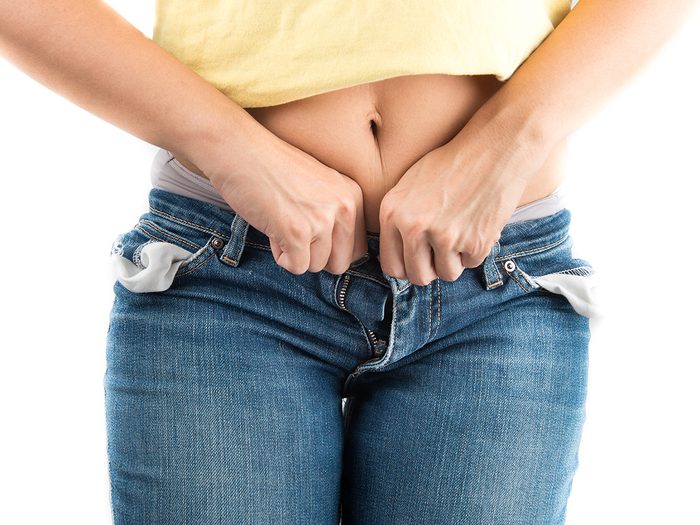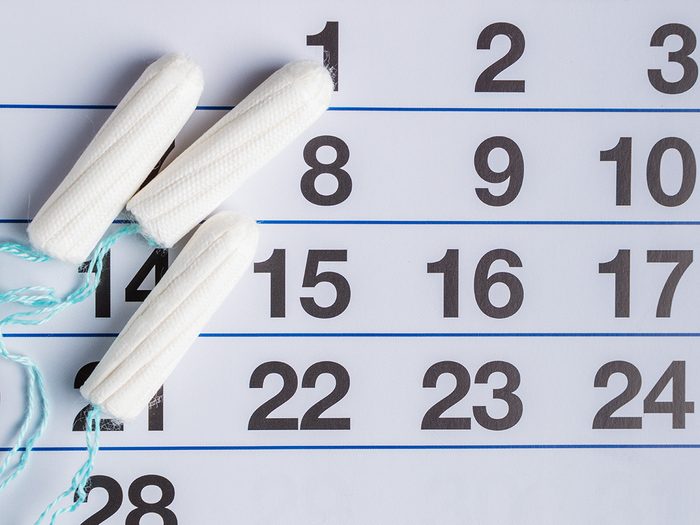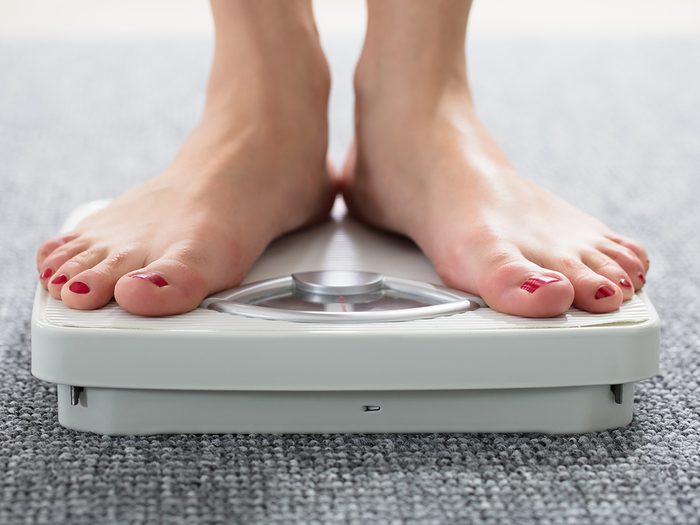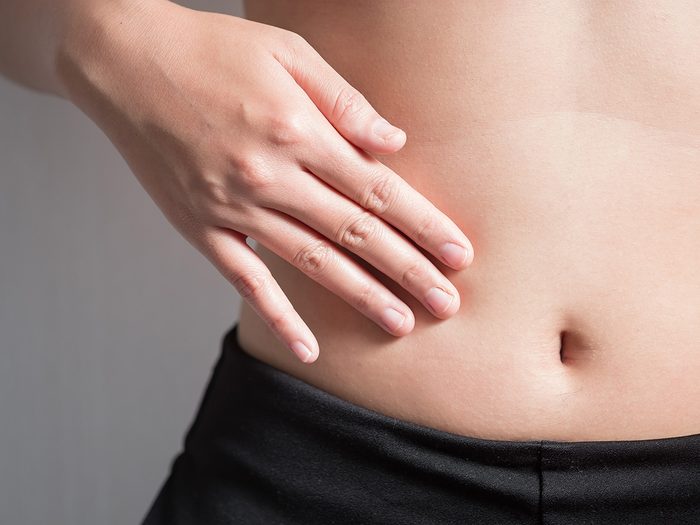
You eat lots of sweets
Some research suggests sugar intake itself actually triggers diabetes — but eating too many sweets definitely causes weight gain, a major risk factor for the disease. “Approximately 90 per cent of type 2 diabetes patients are overweight or obese,” says Mohammad Kawji, MD, CCD, doctor of endocrinology and metabolism disorders at Spectrum Health. “Weight gain is associated with metabolic changes, mainly insulin resistance, which increases the risk to develop diabetes in the future.” As the pancreas has to secrete more insulin to balance blood sugar, it eventually fails, blood sugar rises, and diabetes develops. A simple blood test can test your blood sugar to see if it’s elevated. Unfortunately, Dr. Ng says that diabetes medications can also cause weight gain as they allow the body to absorb more sugar.
And if you need more reasons for cutting back on sugar, we’ve got 25.

Your fat is around the middle
All weight is not created equal — and if you have belly fat or a “spare tire,” it could be a marker for cardiovascular problems. Research from the American College of Cardiology found that the more abdominal weight, the greater the risk of heart disease. “Fat cells in the abdomen are associated with worsening insulin resistance, which in turn is associated with high blood pressure, higher cholesterol, and higher risk for type 2 diabetes mellitus,” says UPMC endocrinologist and internist Jason Ng, MD, Clinical Assistant Professor of Medicine at the University of Pittsburgh. “All of these risk factors increase the risk of heart disease.”
Here’s what a holistic nutritionist recommends for lowering your heart disease risk.

Your period is irregular
For women with polycystic ovary syndrome (PCOS), high insulin levels produce more male hormones called androgens, which affect not only your menstrual cycle but often lead to weight gain, acne, and hair growth. “PCOS causes weight gain through dysregulation of insulin,” says OBGYN Jane van Dis, MD, Medical Director of OB Hospitalist Group in Pasadena, California. “Women with PCOS have insulin resistance, meaning that their cells can’t accept glucose [blood sugar], and the glucose instead gets stored as fat — and the cycle continues.” This is also why women with PCOS are seven times more likely to develop diabetes, she says. If you have irregular periods, talk to your doctor to be assessed for PCOS.

You have no energy
One of the medical reasons you’re tired all the time could be hypothyroidism. And it may also be messing with your weight, according to the American Thyroid Association. “Thyroid hormone affects every single tissue in a human,” Dr. Kawji says. So if the thyroid isn’t producing enough hormone, the body’s processes start slowing down. “Hypothyroidism, or low thyroid status, presents with slow metabolism that leads to weight gain and abnormally high cholesterol levels,” Dr. Kawji says. Although there is no cure, treatment is available to regulate the thyroid, and diagnosis can be made with a simple blood test.

You’re feeling down
According to a review of research in JAMA Psychiatry, obesity increases the risk for depression — and depression also increases the risk for obesity. “When depression hits, self-care can become impaired, and depressed people don’t eat, sleep, or exercise to keep good health,” which leads to weight gain, says psychologist Deborah Serani, PsyD, award-winning author of Living With Depression. It also slows brain functioning, leading to fatigue, she says. “More specific research into understanding depression and weight gain have suggested hormones in the HPA axis — hypothalamus, pituitary gland, and adrenal glands — creates weight gain by releasing too much cortisol, which stores fat,” Dr. Serani says.

You’re being treated for depression
Ironically, taking meds to treat your depression can also cause weight gain, according to research. “Antidepressant medication works to chemically alter neurotransmitters in the brain — by doing so, these medicines help reduce the symptoms of depression,” Dr. Serani says. “However, for many, taking these antidepressant medications also causes other metabolic changes in the body, which result in weight gain.” Along with your doctor, you have to decide if the trade-off is “worth the weight”— and if so, to balance it by eating well, getting enough sleep, and exercising.

You’re stressed
It’s true: Body pain and weight gain are actually signs of stress. And you can thank biology for that, says Dr. Serani. “Back in the Neanderthal days, if it was too dangerous to go search for food or food was scarce to find, the stress hormone cortisol would slow our metabolism down and help store fat so we wouldn’t starve,” she says. “Nowadays, stress isn’t filled with life-or-death situations, but the daily grind still raises our cortisol levels.” Dr. Serani advises stress management techniques like aromatherapy, meditation, yoga, listening to soothing music, or taking a walk.

You’re not getting enough sleep
Research has shown that sleep loss is associated with a wide range of health problems, including weight gain. “People who have poor quality sleep have higher levels of ghrelin, the hormone that increases appetite, and lower levels of leptin, the hormone that decreases appetite,” says sleep expert Richard Shane, PhD, creator of the Sleep Easily method. Plus, “when you sleep better, you will also have more energy and motivation to exercise and to follow through with steps to lose weight.”

You have trouble breathing at night
Another sleep issue associated with weight gain is the dangerous condition obstructive sleep apnea, in which the upper airway becomes blocked during sleep, reducing or stopping airflow. “Weight gain includes weight gain in the neck, which can narrow your airway, increasing the risk of developing sleep apnea,” Dr. Shane says. A sleep study can assess whether you have sleep apnea in order to receive treatment. “When you sleep better, your body will be more responsive to whatever ways you use to lose weight,” Dr. Shane says.

Your joints are stiff
According to the CDC, 23 per cent of adults in the United States have arthritis, of which the most common type is wear and tear on the joints called osteoarthritis. Symptoms like pain, aching, stiffness, and swelling in your joints can be made worse by excess weight — and weight itself can actually contribute to the development of the disease, according to the National Institute on Aging. “Weight gain and obesity are important risk factors in increasing the risk of osteoarthritis development in the hands and knees,” says Dr. Ng. Losing weight can help: One study found that each pound of weight lost relieves four pounds of pressure on the knees.
Learn to Be More Flexible with Our One-Week Stretching Program

You’re gaining weight in weird places
One of the medical causes of a slow metabolism is Cushing’s disease. This disorder causes the adrenal gland to release too much cortisol into the body, often causing a “hump” around the neck, a round “moon face,” and abdominal weight. People at risk include those taking high doses of corticosteroid medication for a long period of time. “Cushing’s disease is a systemic disease that affects multiple organs causing an increase in adiposity [obesity], fat accumulation, and abnormal weight gain,” Dr. Kawji says. “The most common symptoms are central obesity, redistribution of fat around the neck and face, muscle weakness, hypertension, and bruising easily.” Treatment is available to return your body’s production of cortisol to normal levels, so if you have the symptoms, talk to your doctor.

You have abdominal pain
According to the American Cancer Society, ovarian cancer accounts for more deaths than any other cancer of the female reproductive system; yet it’s symptoms in the early stages are nonspecific, so it’s hard to detect. “Common symptoms for women with ovarian cancer are abdominal pain and swelling or bloating,” says Dr. van Dis. “Sometimes this is due to collection of fluid, or ascites, in the abdomen; but even women without fluid collection, in early-stage disease reported bloating and abdominal distention.” Any sudden or unexplained weight gain should be reported to a physician for testing, she says.

You have painful periods
Non-cancerous growths called fibroids could be behind your abdominal distention, a heavy feeling in your belly, and heavy periods. “Women with fibroids, or benign muscle tumors, in their uterus can experience weight gain,” Dr. van Dis says. The U.S. National Library of Medicine estimates 40 to 80 per cent of women have them — luckily, they don’t usually cause harm, and often go away after menopause when the female hormones that feed them stop being produced. But if they are causing unwanted symptoms like weight gain, though, you might want to have them treated sooner with medication or surgery.
What’s Up With Your Period? Find Out If You Have One of These Menstrual Disorders

You’re constipated
If you’re backed up, it can lead you to hold on to excess weight. “Constipation is defined as any two of the following: straining, hard stools, sensation of incomplete defecation, anorectal obstruction, and frequency of less than three bowel movements per week,” says PIH Health Family Medicine physician Mehwish Awan Khan, MD. “Such symptoms can cause weight gain due to prolonged delay in stool transit throughout the colon.” Proper hydration, stool softeners, and a high-fiber diet are the most common ways to improve symptoms of constipation, she says, and help you lose the extra weight. However, constipation can also be a sign of more serious problems like irritable bowel syndrome (IBS) or colon cancer, so if it persists, call your doctor.

You have other GI issues
When that collection of “good” bacteria in your gut gets off track, it can cause something called small intestinal bacteria overgrowth (SIBO). “Small intestinal bacterial overgrowth is characterized as colonization of excessive microbes in the small intestine that are part of the normal colon flora,” Dr. Khan says. “Many patients with SIBO have symptoms such as bloating, flatulence, abdominal pain, or diarrhea. Some of these symptoms can cause weight gain.” Diet, probiotics, and possibly antibiotics can help treat SIBO.
8 Normal Reasons Your Belly Is Bloated — And 4 Times to Worry
